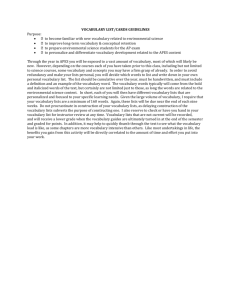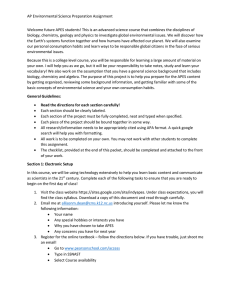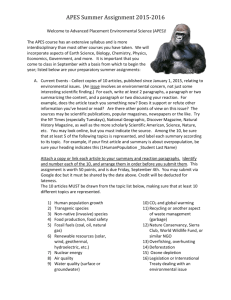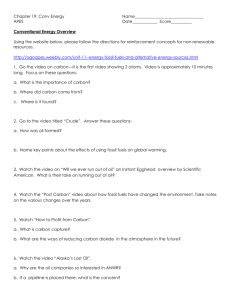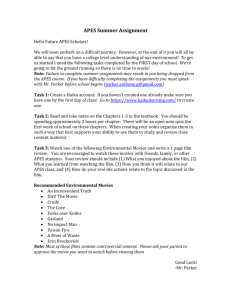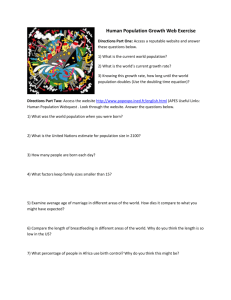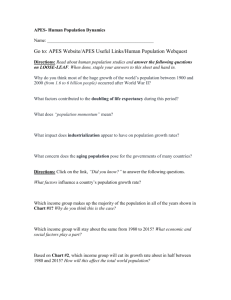APES Summer Assignment
advertisement
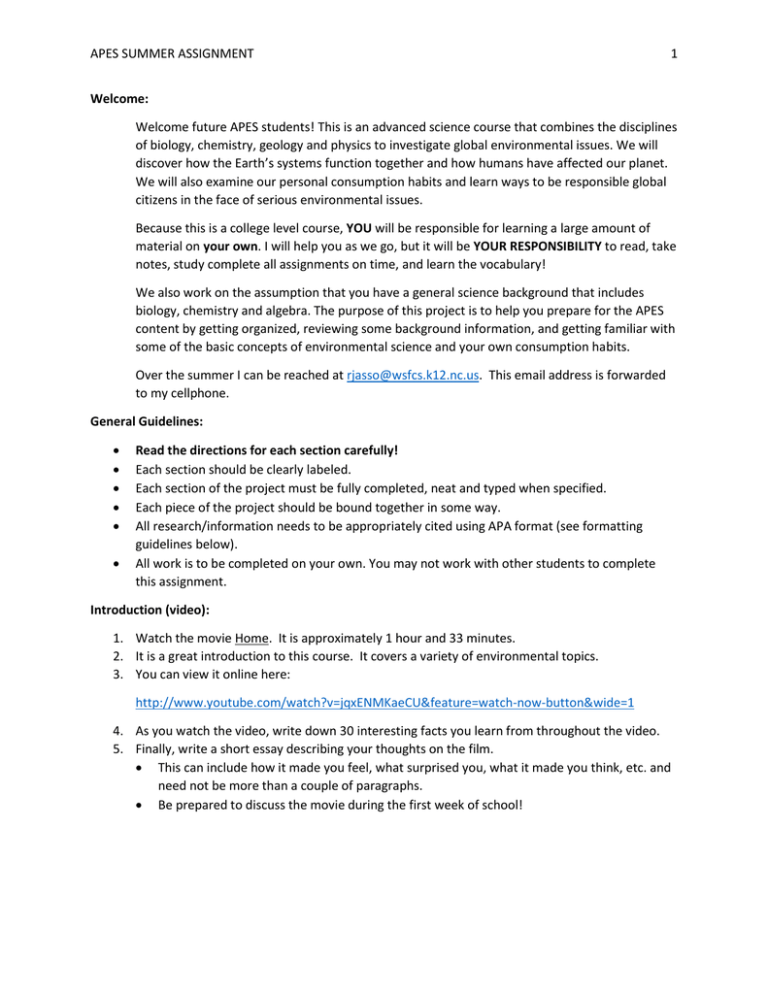
APES SUMMER ASSIGNMENT 1 Welcome: Welcome future APES students! This is an advanced science course that combines the disciplines of biology, chemistry, geology and physics to investigate global environmental issues. We will discover how the Earth’s systems function together and how humans have affected our planet. We will also examine our personal consumption habits and learn ways to be responsible global citizens in the face of serious environmental issues. Because this is a college level course, YOU will be responsible for learning a large amount of material on your own. I will help you as we go, but it will be YOUR RESPONSIBILITY to read, take notes, study complete all assignments on time, and learn the vocabulary! We also work on the assumption that you have a general science background that includes biology, chemistry and algebra. The purpose of this project is to help you prepare for the APES content by getting organized, reviewing some background information, and getting familiar with some of the basic concepts of environmental science and your own consumption habits. Over the summer I can be reached at rjasso@wsfcs.k12.nc.us. This email address is forwarded to my cellphone. General Guidelines: Read the directions for each section carefully! Each section should be clearly labeled. Each section of the project must be fully completed, neat and typed when specified. Each piece of the project should be bound together in some way. All research/information needs to be appropriately cited using APA format (see formatting guidelines below). All work is to be completed on your own. You may not work with other students to complete this assignment. Introduction (video): 1. Watch the movie Home. It is approximately 1 hour and 33 minutes. 2. It is a great introduction to this course. It covers a variety of environmental topics. 3. You can view it online here: http://www.youtube.com/watch?v=jqxENMKaeCU&feature=watch-now-button&wide=1 4. As you watch the video, write down 30 interesting facts you learn from throughout the video. 5. Finally, write a short essay describing your thoughts on the film. This can include how it made you feel, what surprised you, what it made you think, etc. and need not be more than a couple of paragraphs. Be prepared to discuss the movie during the first week of school! APES SUMMER ASSIGNMENT 2 Formatting Guidelines: When submitting essay, papers, or general writings, you will adhere to the guidelines of APA formatting. The Purdue University Owl website is an EXCELLENT site and will be used in our class. I HIGHLY encourage you to bookmark the website for all future references. So get to know it! https://owl.english.purdue.edu/owl/resource/560/01/ APA Resources will also be found on our class webpage once it is done. Electronic Setup I am currently working on our class website for AP Environmental Science (APES), which will be linked to my school system webpage. Here most of your assignments and quizzes/tests will be obtained and uploaded to its appropriate folder. I will email you, with the email address you gave me, when I have set up our online classroom. Internet access will be very important during the year. Much of what you will need can be done using a smartphone. There will also be writing assignments that will require something a bit more, e.g. a tablet, laptop, or desktop computer. I do anticipate having a classroom set of laptops that we will use in class. So…more to come! APES SUMMER ASSIGNMENT 3 Section 1: Chemistry Review Chemistry is a big part of environmental science. It is highly recommended that you take chemistry before registering for this course. In order to review some of the basic chemistry concepts you will need complete the following on a clean sheet of paper. This may be typed or hand written. 1. For each of the following, write out the chemical name that goes with the symbol: CO2 CO C6H12O6 CH4 H2 N2 NO2 NO3 NH3 NH4 O2 O3 P PO43- S SO2 SO3 H2SO4 NaCl Pb U Rn Hg Cl H2O 2. Write at least a paragraph that explains the following: a. What is the pH scale? What does it measure? b. How do the numbers on the pH scale compare? Example – is a pH of 4 twice as strong as a pH of 2? Hint- the pH scale is not linear! c. What are the average pH ratings of the following common substances in the environment? i. Blood ii. Rain iii. Freshwater (lake or river) iv. Ocean water APES SUMMER ASSIGNMENT Section 2: Math Review The APES exam has a significant amount of math and does not allow the use of calculators! Most students find that with a little practice, the math is not difficult, but as many of us have not had practice with setting up and solving problems without a calculator in a long time, in the beginning it can be daunting. 4 APES SUMMER ASSIGNMENT 5 Complete each of the following problems including a detailed set up with labeled units and proper scientific notation. NO CALCULATORS! You must show all work to get credit. o All problems should be expressed in scientific notation (do not write out large numbers with multiple zeros as place holders). 1. What is ten million times three thousand? 2. What is thirty-four million plus two hundred fifty-six thousand times four hundred? 3. A population of deer had 200 individuals. If the population dropped 15% in one year, how many deer were lost? What is the total population of deer the next year? 4. One year we had 120 APES students and the next year we had 150 APES students. What percentage did the population of APES students grow by? 5. One year we had 2500 endangered sea turtles hatch. After one year there were only 1500. What percentage of turtles died? 6. Electricity costs 6 cents per kilowatt hour. In one month one home uses one megawatt of electricity. How much will the electric bill be? (be sure to look at the conversion chart for the conversion factor from kilo to mega) 7. Your car gets 12 miles to the gallon and your friend’s car gets 20 miles to the gallon. You decide to go on a road trip to Virginia Tech, which is 300 miles away. If gas costs $4 per gallon and you decide to split the gas money, how much money will you save by driving your friend’s car? 8. A turtle was crawling at the rate of 38 cm per minute. How many kilometers would the turtle crawl in 2 hours? 9. A turtle was crawling at the rate of 43 cm per minute. How many kilometers would this turtle crawl in one day (24 hours) if it did not rest and continued to crawl at a continuous pace? 10. There are 125 blades of grass in a square cm of lawn. Assuming the grass stand is even, how many blades of grass would be found in a lawn measuring 8 meters by 6 meters? Use scientific notation in your answer. 11. You purchase a home that is 2500 square feet of living space. How many square meters of lving space is this? 12. If a calorie is equivalent to 4.184 joules, how many joules are contained in a 250 kilocalorie slice of pizza? 13. A coal-fired electric power plant produces 12 million kilowatt-hours (kWh) of electricity each day. Assume that an input of 10,000 BTUs of heat is required to produce an output of one kilowatt-hour of electricity. Calculate the number of BTUs of heat needed to generate the electricity produced by the power plant each day. 14. (Using the information in 13) Calculate the pounds of coal consumed by the power plant each day assuming that one pound of coal yields 5,000 BTUs of heat. 15. If a city of 10,000 experiences 200 births, 60 deaths, 10 immigrants and 30 emigrants in the course of a year, what is its net annual percentage growth rate? (By what percentage did the population change?) APES SUMMER ASSIGNMENT 6 Section 3: Environmental Legislation Create a chart similar to the one on this page, or use this one, and fill in the missing information pertaining to important legislation. Make sure this is typed so that you can add as many details as needed! You can change the formatting to fit your preferences (example – make it landscape if that’s easier for you). We will study MANY different environmental policies throughout the year. These are just a few to get you started. Legislation Name Kyoto Protocol Montreal Protocol Agenda 21 London Dumping Convention Helsinki Convention CITES SMRCA RCRA Lacey Act Clean Water Act Safe Drinking Water Act Clean Air Act Antiquities Act Endangered Species Act CERCLA Is this a US or World Treaty, Law or Act? Date Enacted (Year) Description of the Legislation (Give the purpose, important founding organizations or people, any major points that you find) APES SUMMER ASSIGNMENT 7 Section 4: Current Events In environmental science, it is important to know about current issues in the new. One of my goals is to familiarize you with environmental issues that are important to our community, country and world. We will be reading and discussing a variety of current events throughout the school year as well. Over the course of the summer, find 3 recent articles related to environmental science. All articles should be current (during the past 2 years) and taken from a reliable source. The sources may be scientific publications, popular magazines, newspapers etc. Try the NY times (especially Tuesday), Washington Post, National Geographic, Discover Magazine, Natural History Magazine, Treehugger.com, etc. I do not care if you use a paper or online copy of your article as long as it is property cited (APA format). Each article should relate to a different topic chosen from the following list. As the year progresses you will be able to cover all of the topics! Environmental Law Water pollution Nonrenewable energy Ecosystems Climate Evolution Population growth Food/agriculture Cities and waste Geology Air pollution Human Health Preserving our biodiversity Renewable Energy Forest or Rangeland Article Analysis Directions: Include all of the following components and clearly identify each component with headings. Each analysis should be typed. Each article should be on its own paper. Remember to use APA formatting! These three article will make for good practice for what will come later. Cover page (containing the title of the Article) Body/Summary: brief summary that tells me what the article is about. a. Analysis: i. Points of view (POV) – does the article have more than one side/pov? If so what are they? ii. Bias – Is this article biased in any way? In your opinion, does the author give a positive, negative, or neutral view of the environmental science topic? iii. Controversy: Is there any controversy surrounding this article? If so briefly explain it. iv. Your perspective: State your perspective on this news article based on your personal knowledge of the topic and your reading of the article. v. Effect on you: How does this topic relate to you or your affect you? Reference page a. Attach the article – either a physical copy of the article or a working web address in APA format. APES SUMMER ASSIGNMENT 8 Checklist: Please place this completed checklist at the front of your assignment before you turn it in. Name ____________________________________________________________________________ Section 1: Score ___________/20 I have been to the course website. I have read the course syllabus. I have emailed Ms. Dean. I have registered for the online textbook and course. I have read through chapter 1 of the online text. I have completed the chapter 1 assignment. Section 2: Score ____________/20 I have identified all of the chemical compounds and I am ready for a quiz. I have written at least one paragraph about pH and I am ready to explain it to someone else. I have cited all of the sources I used to find my information. Section 3: Score ____________/20 I have read through the math review material and understand how to solve these types of problems. I have completed all of the review problems and am ready to take a math quiz. Section 4: Score ____________/20 I have researched and recorded information for all of the legislation listed. I have cited all of the sources I used to find my information. I have studied the legislation and am ready for a quiz. Section 5: Score ____________/20 I have completed three article current events. I have either attached a paper copy of my article, or listed a working web address to my article. This Assignment is due on our first meeting when you enter the classroom. If you turn in the assignment late, you will only earn a MAXIMUM of 50% (as this is the policy for all late work in APES). If you turn in this assignment on our first classes, you can receive up to 25 bonus points on our first exam!
